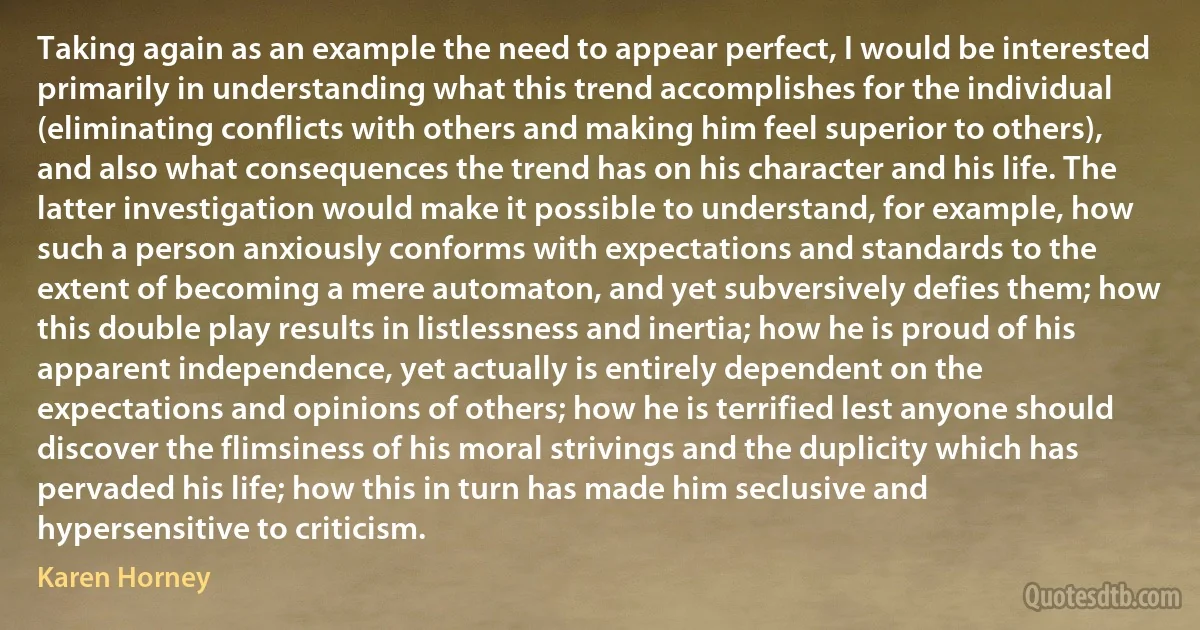
Taking again as an example the need to appear perfect, I would be interested primarily in understanding what this trend accomplishes for the individual (eliminating conflicts with others and making him feel superior to others), and also what consequences the trend has on his character and his life. The latter investigation would make it possible to understand, for example, how such a person anxiously conforms with expectations and standards to the extent of becoming a mere automaton, and yet subversively defies them; how this double play results in listlessness and inertia; how he is proud of his apparent independence, yet actually is entirely dependent on the expectations and opinions of others; how he is terrified lest anyone should discover the flimsiness of his moral strivings and the duplicity which has pervaded his life; how this in turn has made him seclusive and hypersensitive to criticism.
Karen HorneyRelated topics
anyone appear automaton becoming character criticism double duplicity example inertia lest life making mere need perfect person play possible should superior taking trend turn understanding yet othersRelated quotes
In schools, for example, there are courses in the criticism of literature, art criticism, and so forth. The arts are supposed to be 'not real.' It is quite safe, therefore, to criticize them in that regard -- to see how a story or a painting is constructed, or more importantly, to critically analyze the structure of ideas, themes, or beliefs that appear, say, in the poem or work of fiction. When children are taught science, there is no criticism allowed. They are told, 'This is how things are.' Science's reasons are given as the only true statements about reality, with which no student is expected to quarrel. Any strong intellectual explorations or counter versions of reality have appeared in science fiction, for example. Here scientists, many being science-fiction buffs, can channel their own intellectual questioning into a safe form. 'This is, after all, merely imaginative and not to be taken seriously.'

Robert Butts
The unremitting division of labour resulted in admirable levels of productivity. The company's success appeared to bear out the principles of efficiency laid down at the turn of the twentieth century by the Italian economist Vilfredo Pareto, who theorized that a society would grow wealthy to the extent that its members forfeited general knowledge in favour of fostering individual ability in narrowly constricted fields. In an ideal Paretan economy, jobs would be ever more finely subdivided to allow for the accumulation of complex skills, which would then be traded among workers. ... But however great the economic advantages of segmenting the elements of an afternoon's work into a range of forty-year-long careers, there was reason to wonder about the unintended side effects of doing so. In particular, one felt tempted to ask ... how meaningful the lives might feel as a result.

Alain de Botton
In immediate self-consciousness the simple ego is absolute object, which, however, is for us or in itself absolute mediation, and has as its essential moment substantial and solid independence. The dissolution of that simple unity is the result of the first experience; through this there is posited a pure self-consciousness, and a consciousness which is not purely for itself, but for another, i.e. as an existent consciousness, consciousness in the form and shape of thinghood. Both moments are essential, since, in the first instance, they are unlike and opposed, and their reflexion into unity has not yet come to light, they stand as two opposed forms or modes of consciousness. The one is independent whose essential nature is to be for itself, the other is dependent whose essence is life or existence for another. The former is the Master, or Lord, the latter is the Bondsman.

Georg Wilhelm Friedrich Hegel
For, strange as the statement will appear at first sight, modern metaphysics, and to a large extent modern physical science, have been groping for centuries blindly after knowledge which occult philosophy has enjoyed in full measure all the while. Owing to a train of fortunate circumstances, I have come to know that this is the case; I have come into some contact with persons who are heirs of a greater knowledge concerning the mysteries of Nature and humanity than modern culture has yet evolved; and my present wish is to sketch the outlines of this knowledge, to record with exactitude the experimental proofs I have obtained that occult science invest its adepts with a control of natural forces superior to that enjoyed by physicists of the ordinary type, and the grounds there are for bestowing the most respectful consideration on the theories entertained by occult science concerning the constitution and destinies of the human soul.

Alfred Percy Sinnett
I always say-a prejudice on my part, I'm sure-you can tell a lot about a person's character from his choice of sofa. Sofas constitute a realm inviolate unto themselves. This, however, is something that only those who have grown up sitting on good sofas will appreciate. It's like growing up reading good books or listening to good music. One good sofa breeds another good sofa; one bad sofa breeds another bad sofa. That's how it goes. There are people who drive luxury cars, but have only second- or third-rate sofas in their homes. I put little trust in such people. An expensive automobile may well be worth its price, but it's only an expensive automobile. If you have the money, you can buy it, anyone can buy it. Procuring a good sofa, on the other hand, requires style and experience and philosophy. It takes money, yes, but you also need a vision of the superior sofa. That sofa among sofas.

Haruki Murakami
